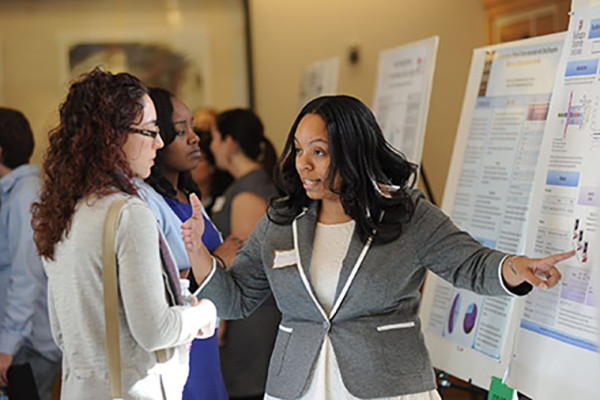Grad, professional students present research while honing communication skills during annual event
Graduate and professional students presented their research during the 19th Annual Graduate Student Research Symposium, held Feb. 22 in Whitaker Hall. Suthatip Jullamon, a law student, explains her research comparing class-action law in Thailand with the U.S.
Washington People: Gammon Earhart
Gammon Earhart, PhD, a professor in the Program in Physical Therapy at the School of Medicine, works to restore movement to patients with Parkinson’s disease. Arguably her most significant contributions as a researcher have been her studies demonstrating the
benefits of tango dancing on patients with Parkinson’s. Freedom of movement, it turns out, has become a theme of sorts for Earhart — professionally and personally.
Medical Center showcases Campus Renewal plans
Washington University Medical Center is sharing a first look at its future landscape with renderings of the new Barnes-Jewish Hospital north campus tower and St. Louis Children’s Hospital expansion. The first phase of the Campus Renewal Project includes an expansion of Siteman Cancer Center, surgical programs, diagnostics and services for women and infants.
Imbalanced hearing is more than a mild disability
Asymmetric hearing is a difference between the two ears’ ability to detect and process sound. New studies indicate that people with asymmetric hearing experience greater communication difficulties than previously assumed. Researchers led by Jill B. Firszt, PhD, have received a $3 million grant from the National Institutes of Health (NIH) to study the effects of asymmetric hearing loss in adults and children.
Global conference focus: maternal and child health, infections in animals that threaten humans
On March 28, renowned researchers from around the globe will gather in St. Louis to discuss maternal and child health and infections in animals that threaten humans. These topics will be highlighted at the second annual conference of the Washington University Center for Global Health and Infectious Disease.
Research aims to improve repair of rotator cuff injuries
With a five-year, $3.1 million grant from the National Institutes of Health, Washington University orthopedic researchers and engineers are working to enhance rotator cuff repair surgery.
New cyclotron to help doctors detect cancers
A new cyclotron recently was installed at the East Building on the School of Medicine campus. The unit, in the works for more than a decade, is a particle accelerator that will produce radioactive compounds, many of which are used with positron emission tomography (PET) scanners to detect specific types of cancers.
Free birth control doesn’t promote risky sexual behavior in women
Researchers at the School of Medicine have shown that providing women with free contraception does not increase the likelihood that they will have sex with multiple partners, as critics of the practice have suggested. Shown is the study’s first author, Gina Secura, PhD.
See the future of the campus – March 10 and 11
The Washington University Medical Center is undergoing the initial phases of a transformation that primarily will feature expansions of St. Louis Children’s Hospital, Barnes-Jewish Hospital and Siteman Cancer Center. It also will include more space for Washington University Physicians clinics and diagnostics and new facilities for women and infants, oncology and surgical services. If you’re curious about the expansion, renderings will be on display and staff will be on hand to answer questions March 10 and 11 at two campus locations.
Biomarkers of cell death in Alzheimer’s reverse course after symptom onset
Three promising biomarkers being studied to detect Alzheimer’s disease in its early stages appear to undergo a surprising shift as patients develop symptoms of dementia, researchers led by Anne Fagan, PhD, at the School of Medicine report.
View More Stories

